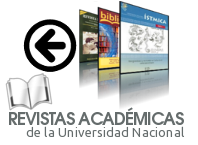Revolutionary lands: precariousness and social and ecological contingency in the Nicaraguan documentary Magic words (to break an enchantment) (2012) by Mercedes Moncada
DOI:
https://doi.org/10.15359/istmica.25.6Keywords:
Sandinista Revolution, precarity, contingency, ecocriticism, documentary filmAbstract
This essay examines the relationality and representation of Nicaraguans and nature through frameworks of precarity and ecocriticism. The documentary film Palabras mágicas (para romper un encantamiento) (2012) by Mercedes Moncada presents the earth as an extension of the self, firstly, as an allegory of the country, the revolution and the individual, and, secondly, through the contingency and vulnerability of the environment and Nicaragua’s people. Both Nicaraguans and nature are victims of a political system that repeats itself during the 20th and 21st centuries. Through the notions of corporality and materiality, the documentary establishes a link between the Nicaraguan subject and land through their discursivity, both as sites of inscription that are subject to relations of power, a fact that makes them both precarious. Palabras mágicas (2012) proposes that both are victims the somocismo of the 20th century and Ortega’s neosandismo of the 21st century. Finally, from the metaphorical link between Nicaragua’s environment and people, one of the results is framing the environment within a framework of precarity and vulnerability, highlighting contingency and dependency between both humans and itself.
References
- Agamben, G. (1998). Homo sacer: Sovereign Power and Bare Life. D. Heller-Roazen, Trad.). Stanford, CA: Stanford University Press.
- Antillón, C. (2015). “Managua, Nicaragua is a beautiful town:” discurso colonial sobre Centroamérica en la música popular estadounidense.” Revista de historia, 33-34, 29-48.
- Buell, L. (1995). The Environmental Imagination: Thoreau, Nature Writing, and the Formation of American Culture. Cambridge, MA: The Belknap Press of Harvard University Press.
- Burucúa, C., & Carolina Sitnisky, C. (2018). Introduction: Forms of the Precarious in the Cinemas of the Americas. En C. Burucúa & C. Sitnisky (eds.), The Precarious in the Cinemas of the Americas (pp. 1-18). London: Palgrave Macmillan.
- Butler, J. (1997a). Lenguaje, poder e identidad. (J. Sáez & B. Preciado, trads.). Madrid: Editorial Síntesis.
- Butler, J. (1997b). Mecanismos psíquicos del poder: Teorías sobre la sujeción. (J. Cruz, trad.). Madrid: Ediciones Catedra.
- Butler, J. (2006). Vida precaria: El poder del duelo y la violencia. (F. Rodríguez, trad.).Barcelona: Paídos.
- Butler, J. (2010). Marcos de guerra: Las vidas lloradas. (B. Moreno Carrillo, trad.). Barcelona: Paidós.
- Constitución del Ecuador. (2008). Ecuador: Asamblea Constituyente. Recuperado de: https://www.acnur.org/fileadmin/Documentos/BDL/2008/6716.pdf.
- Cortés, M. L. (2005). La pantalla rota: cien años de cine en Centroamérica. México: Taurus historia.
- Evernden, N. (1996). Beyond Ecology: Self, Place, and the Pathetic Fallacy. En C. Glotfelty & H. Fromm, The Ecocriticism Reader: Landmarks in Literary Ecology (pp. 92-104). Athens, GA: The University of Georgia Press.
- Gill, R., & Pratt, A. (2013). Precarity and Cultural Work in the Social Factory? Immaterial Labour, Precariousness and Cultural Work. Oncurating, 16, 26-40.
- Glotfelty, C. (1996). Introduction: Literary Studies in an Age of Environmental Crisis. En C. Glotfelty & H. Fromm, The Ecocriticism Reader: Landmarks in Literary Ecology (pp. xv-xxxvii). Athens, GA: The University of Georgia Press.
- Grinberg Pla, V. (2015). Interpelaciones al sandinismo desde el cine nicaragüense contemporáneo: Palabras mágicas de Mercedes Moncada. Revista Iberoamericana, LXXXI/251, 539-553.
- Jones, G. (2003). Latin American Geographies. En P. Swanson (ed.), The Companion to Latin American Studies (pp. 5-25). London: Arnold Publishers.
- Judson, F. (1987). Sandinista Revolutionary Morale. Latin American Perspectives, 14(1), 19-42.
- Laclau, E., & Mouffe, C. (1987). Hegemonía y estrategia socialista: Hacia una radicalización de la democracia. México: Siglo XXI.
- Moncada Rodríguez, M. (Productora/Directora), & Sánchez Sosa, J. (Productor). (2012). Palabras mágicas (para romper un encantamiento) [Documental]. México: Amaranta Producciones.
- Oficina del Alto Comisionado de las Naciones Unidas para los Derechos Humanos (OACNUDH). (Agosto de 2018). “Violaciones de derechos humanos y abusos en el contexto de las protestas en Nicaragua 18 de abril - 18 de agosto de 2018.” Recuperado de: https://www.ohchr.org/Documents/ Countries/NI/HumanRightsViolationsNicaraguaApr_Aug2018_SP.pdf
- Palacios, A. (2013). Memoria e Imagen. Palabras Mágicas. Carátula. Revista Cultural Centroamericana, 53 [abril/mayo 2013]. Recuperado de: http:// www.caratula.net/ediciones/53/
- Rodríguez, I. (2010). Desorientaciones geográficas, extrañamientos lingüísticos, deposiciones desarticuladas, rediseño de tierras, reescritura de leyes, conversiones fingidas. Culturas en pugna, historias sin fin. En I. Rodríguez & J. Martínez (eds.), Estudios transatlánticos postcoloniales: I. Narrativas comando/sistemas mundos: colonialidad/modernidad (pp. 7-46). Barcelona: Anthropos.
- Rodríguez, I. (2011). Hombres de empresa, saber y poder en Centroamérica: Identidades regionales/modernidades periféricas. Managua: Instituto de historia nicaragüense y centroamericana.
- Rodríguez, I. (2016). Gender Violence in Failed and Democratic States: Besieging Perverse Masculinities. London: Palgrave Macmillan.
- Wiek von Mossner, A. (2014). Introduction: Ecocritical Film Studies and Effects of Affect, Emotion, and Cognition. En A. Wiek von Mossner (ed.), Moving Environments: affect, emotion, ecology, and film (pp. 1-22). Waterloo, ON: Wilfrid Laurier University Press.
- Willoquet-Maricondi, P. (2010). Introduction: From Literary to Cinematic Ecocriticism. En P. Willoquet-Maricondi (ed.), Framing the World: Explorations in Ecocriticism and Film (pp. 1-24). Charlottesville, VA: University of Virginia Press.
Downloads
Published
How to Cite
Issue
Section
License
Las personas autoras que publiquen en esta revista permiten cesión gratuita, exclusiva, de ámbito mundial de sus derechos de autoría a la Universidad Nacional (Costa Rica), conservando únicamente sus derechos morales sobre la obra publicada.
Los artículos pueden ser citados y copiados, citando a la persona autora y la fuente. Todos los artículos publicados en la Revista Ístmica están protegidos bajo una Licencia Creative Commons Atribución-NoComercial-CompartirIgual 4.0 Internacional







